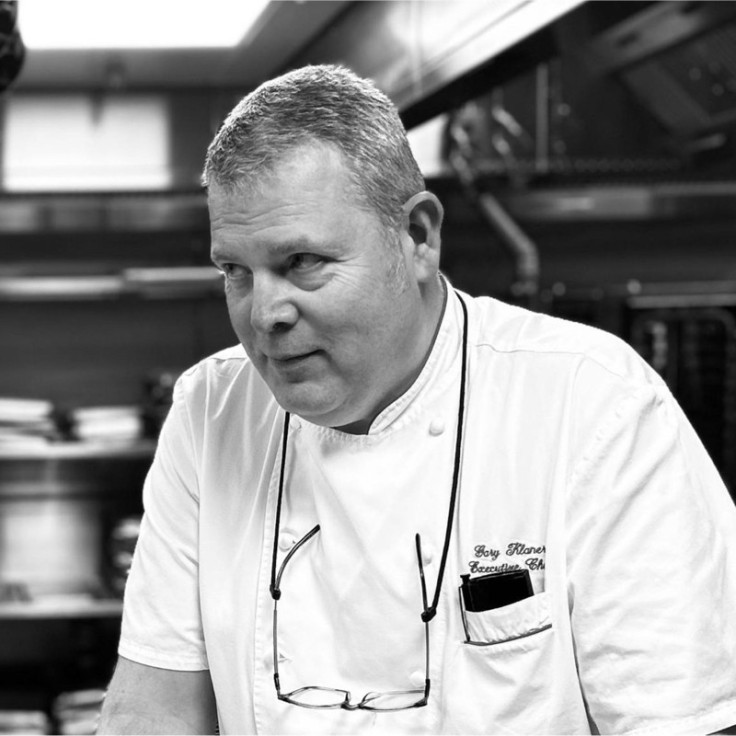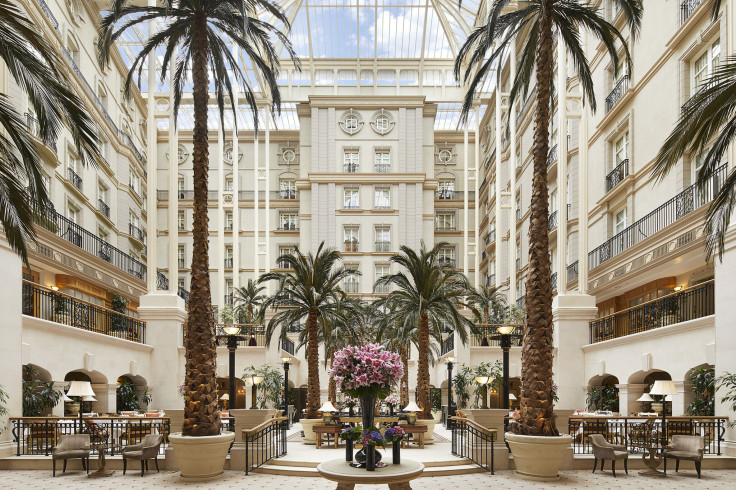
"I never decided or wanted to be a chef. I was interested in engineering and architecture, but I wasn't the most academically inclined at school. So, given my father was a pastry chef, my next instinct was to go into hospitality," says Gary Klaner; a humble answer from a man who is the Executive Head Chef of one of London's original five-star Grande Dame luxury hotels - The Landmark London.
Having worked for Klaner for nearly three years, first as an apprentice and then as a Commis Chef, my early memories are of his imposing stature. At 6'4" and as someone who isn't very talkative, he can appear intimidating.
Appearances can be deceiving, though. His willingness to connect to everyone in the kitchen surprised me more than once. A pep talk in his office when I was preparing for my chef qualification practical exam, comes to my mind.
"I studied two years full time at Westminster College. Following that, I did a work placement at what was then called Le Meridien Hotel on Piccadilly", he says. "Then I was hired into a full-time job. That was in 1989."
He credits his three and a half years at Le Meridien as the foundation of his career. He remembers the one Michelin-starred Oak Room at Le Meridien at the time, as a wonderful introduction to the industry.
"It's not a race: work hard and don't be afraid to make mistakes."
"I was fortunate to be in a very good hotel with great people. They kept investing in me and I learned to work hard, and then I learned to cook properly. If you want to achieve something in this industry, you have to work hard."
Klaner's observation may seem simple, but it is at the heart of what it takes to succeed. Being able to work hard consistently and under pressure is the first step and mastering the nuances of cooking techniques comes later.
"It was very difficult. I had no practical experience, just catering college," Klaner recalls.
He credits Le Meridien's Executive Head Chef at the time, David Chambers, and Executive Sous Chef, Alan Maw, as great mentors.
"Alan stands out a lot. He provided me with the opportunity but we had to pick it up and do something with it."
Klaner reflects on cultural changes in the industry over the years.
"Kitchens were very different then to how they are now," he says, referring to the management style and working environment. He emphasises that whilst there have been important improvements in the kitchen work environment in the last few decades, perhaps something has also been lost.
It is not the first time I have heard a chef say this. In fact, what he says next is a repeat, almost verbatim, of reflections shared with me by another talented Head Chef, one almost a generation behind Klaner.
"The camaraderie we had in the kitchen was second to none. In those days, you worked hard and played hard. After a long shift - 14 hours, rightly or wrongly - we would go out in the evening at 11 o'clock and think nothing of it. The teamwork was tight. That was one of the values that we were taught.
"As a team, you were invincible and you could do anything together. The focus was on not letting the team down. We looked out for each other."
Klaner acknowledges, "It was old school. It was tough in some ways." He goes on to say, "of course, it was not all good; but I think it set you up."
The kitchen is a demanding environment. What these senior chefs are putting a finger on is that success in the career depends on a willingness to tackle that pressure and work hard.
The workplaces that tend to succeed in this endeavour also have another thing in common: strong teamwork.
The Towering Atrium at the Heart of The Landmark London Hosts the Hotel's 2AA Rosette Winter Garden Restaurant
He reflects on what he feels is an erosion of skills on the job. Whilst acknowledging external pressures on the industry, he says: "There is endless opportunity (in London) for anyone wishing to learn. One has to have the patience to learn at a steady pace. The younger generation is in a race to learn - unfortunately, you cannot fast track that learning. A lot of on-the-job training has to occur - you have to stick with it and learn from your mistakes."
His advice to newcomers is to "work hard, not be afraid to make mistakes, learn from your mistakes, and most importantly, stick with it. Not everyone learns at the same pace. It's not a race."
Reflecting further on skill levels, Klaner says: "Some could argue that classical training is less relevant. Some establishments buy in pre-made hollandaise - but I do think it is part of the training to learn these basics.
"If you're in a bind on a Sunday evening, does anyone in the kitchen know how to make mayonnaise?"
I ask him whether compensation levels in the industry discourage new entrants - he makes the point that since Covid, salaries and benefits have been revised upwards.
"Was I ready? Probably Not": Leading The Landmark
We steer the conversation back to Klaner's journey.
Fast forward to when he came to The Landmark London, which he joined in 1998 - as a Senior Sous Chef. Within three months, he was promoted to Executive Sous Chef of the hotel.
"As the Executive Sous Chef, I was the operational lead, running the kitchen. When the Executive Head Chef decided to leave, I was promoted to the senior role."
He was just 28. What he says next offers a clue to how he set himself up for success.
"Was I ready? Probably not, I had a lot to learn. I remember going to the GM at the time. He gave me the job and the rest is history. At the time, I was out of my depth. I was not ready - but is there such a thing? You have to take a stab at it."
When I ask him to share some particularly special memories, there are too many to count but he obliges nonetheless.

"The Landmark London hosted a banquet for the South African High Commission. Her Majesty Queen Elizabeth and the Royal Family were in attendance. That was just a few years into my career at The Landmark London, but it stands out.
"It was in the Marble Ballroom - approximately 300 people. The menu had a South African theme - so we put our creative hats on and made it a success."
The Landmark London is part of sporting history as well. The English Cricket team stayed in the hotel when they won the 2019 World Cup. The story of their well-deserved celebrations after the win are part of The Landmark London lore.
Naturally, the topic of COVID comes up. The hotel was closed in line with national guidelines.
Klaner convinced management to turn this into an opportunity and take the time to renovate and enlarge the main kitchen of the hotel in December 2020.
"Approvals were tricky to get - especially given Covid; but we embarked on a multi-million pound project. We even incorporated the upper level car park into the kitchen; new extraction, new drainage, new services."
Despite the scale, he says "the works were finished just in time, taking only nine months."
Clearly, at this level, leadership is not just about good food, about supervising or even managing staff, but about the big picture of the business.
Even in corporate office environments, management skills training is a tricky proposition. I ask Klaner how he developed into his managerial role.
"You learn by doing the job, you learn by making mistakes, getting feedback. I worked with strong Hotel Managers and Financial Controllers. They taught me along the way and they taught me the hard way.
"You move the focus from cooking to running a department and a business. There are financial pressures and quality pressures."
Leading the Kitchen Brigade
He then opens up to share the complexities of managing individuals, saying: "What's challenging is to go from a supervisor to a leader. To lead a team is hugely daunting. Everyone has different personalities. You make mistakes, you may not look after the right people every time, it's about trying to get people to work with you and giving people enough freedom to learn and develop. It's a massive balancing act."
In his long career, Klaner has mentored many talented chefs. A particularly satisfying story comes in the form of Matthew Fletcher, who more than a decade ago, worked under Klaner at The Landmark London.
Recently, Fletcher returned to take the role as Chef de Cuisine at his namesake, Great Central Pub by Matt Fletcher, on the basement level in the hotel, formerly Great Central Bar.
"What I recognised with Matt - the cooking is important - but when someone takes on the ownership and responsibility, that is special. Whilst working under me, he was not the most experienced, but he would take ownership, work very hard and had an appetite to learn. That's where the connection grew - not just cooking, but taking responsibility. A Head Chef is reliant on people taking ownership for their sections."
Balancing Act: Family Time
Klaner is married with a 12-year-old daughter. I ask him about work-life balance, especially given the pressures of hospitality.
"I'm very fortunate to have the wife that I have," he says with a smile. "Without Linda's support, I would not be able to do the job that I do."
Still, having navigated the career to the top, Klaner has more time these days to spend on family life.
Of his daughter, Lara, he says: "I get the odd, 'Oh do you have to work?', but she understands - I'm not saying she agrees, but she understands!"
"For instance, over the holidays, I like to work Christmas with my team. If I have just four or five days for New Year then that's all I have - we just have to make that time the most special it can be."
This prompts a recollection from me of Chef Klaner joining us for the mammoth breakfast service during Christmas - just to see him walking around and hearing his words of encouragement revved up the team for the challenge of working seven days non-stop at the busiest time of the year.
As an executive chef, he led from the front, sacrificing time at home, so his kitchen family would go into a busy season with high morale.







